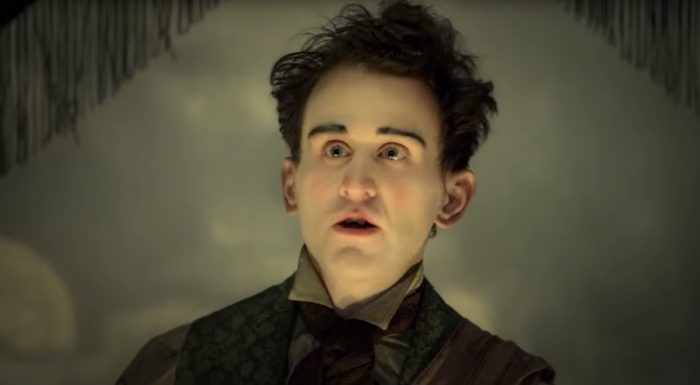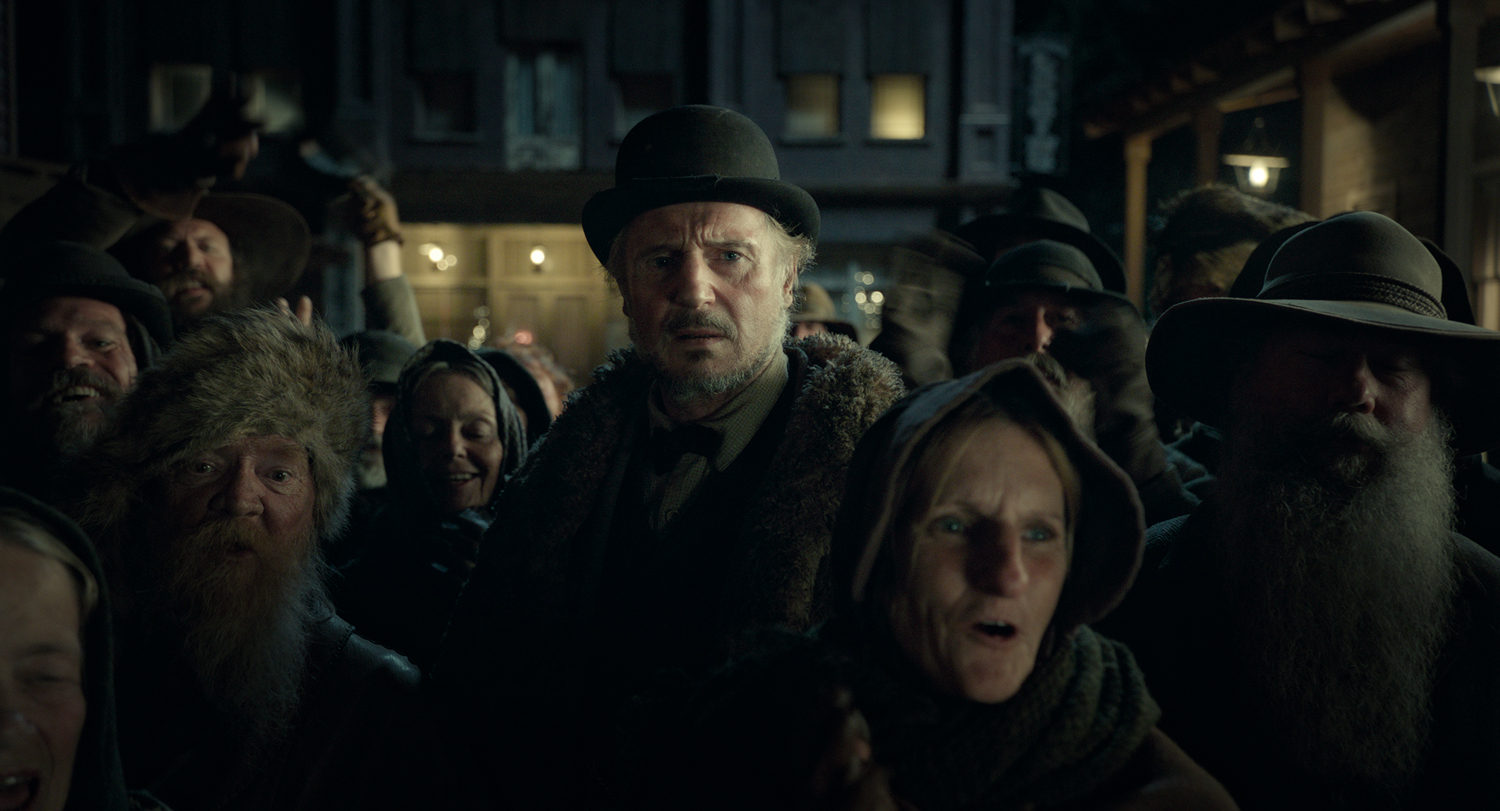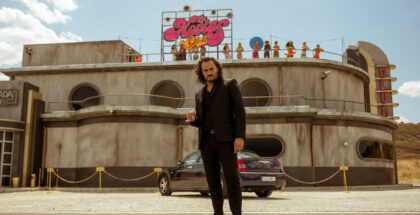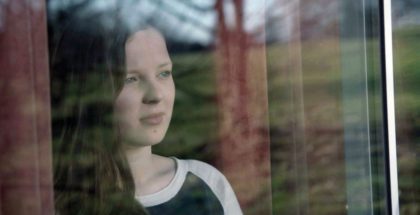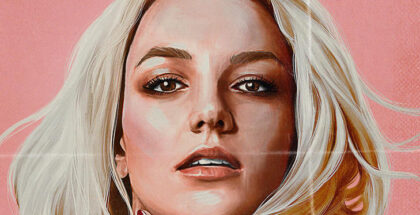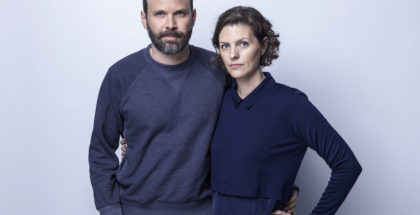Interview: Harry Melling talks The Ballad of Buster Scruggs, Netflix and Liam Neeson with horses
David Farnor | On 15, Nov 2018
Harry Melling is one of the most interesting rising stars of Britain’s stage and screen. Capable of unpredictably switching from menacing to silly and from quirky to tragic, he’s impressed repeatedly over the years alongside Jon Simm and Simon Russell Beale in Harold Pinter’s The Hothouse, Frank Langella in King Lear, and Robert Pattinson in The Lost City of Z. Now, he’s about to do the same in the Coen brothers’ latest film, The Ballad of Buster Scruggs – not bad for an actor that some may best know for playing Dudley Dursley as a child.
A six-part Western film, Melling stars in Meal Ticket opposite Liam Neeson, playing a quadriplegic actor who recites famous literary speeches for Neeson’s near-silent impresario – but despite his eloquent delivery, the crowds begin to dwindle, testing the relationship between the two men. We catch up with Harry as the film premieres at the London Film Festival, to talk Netflix, Liam Neeson’s relationship with horses and how a young British character actor got a starring role in a Coen brothers picture.
Jeff Bridges, Frances McDormand… Harry Melling. Did you ever expect to see your name in a Coen brothers film?
I mean, it’s a dream come true. I grew up watching that film. Just to get the opportunity to go in and meet them in the auditions stages was wonderful and then to be offered to be in it was just a brilliant happening. I mean, you look at all that body of work and all the people they’ve worked with and the films they produced and the sort of variety of films, you know, the fact that they dip in and out of different genres, they’re not ever stuck in one form, they’re truly geniuses in that respect.
The Coens are always very good finding just the right person for each role. How did you get cast?
So yeah, I started off with a tape that I sent to Ellen Chenoweth, who was casting it, and then Joel and Ethan were in London, so I went to meet them and then pretty much as I was leaving leaving the room, I got a call saying they’d like to see me again tomorrow. And I met them again and then was offered it after that. So it was a very conventional sort of audition stage thing.
You’ve done some excellent work in The Hothouse and King Lear on stage. How much thought goes into the variety of work when choosing roles?
A lot of thought. I’ve always wanted to do interesting work, not necessarily the sort of role that’s the biggest or whatever you’d like to call it, in terms of the game of playing within the industry that I think some people quite rightly choose to navigate through. But I’ve always wanted to do the parts that I find most interesting and the projects I find most interesting and that’s always been my measure for what work I do next. And I’m just trying to make sure that is always the yardstick, so to speak, in the work that I do.
Are you at a point where you’ve got a preference between theatre or film or TV?
No, I mean, what I find is that often when you’re doing more of the one medium you want to do the other. I remember I had a year in the theatre that was pretty solid back-to-back theatre and by the end I was thinking ‘I could really do with some screen work! Because I am knackered!’ I’m not saying the screen work is any less. knackering, but it’s a different pace. And then these past two years has just been screen work, so you think ‘Oooh, it’d be nice get some theatre work. You know, the grass is always greener. But as long as I’m doing interesting interesting roles and I’m happy really.
Did you get the script for the whole film or just your segment?
When I was auditioning for it, I got just my segment, so I had no concept of what the whole thing was, apart from a collection of six small stories. And then, when I was offered, I got the whole thing and it all started to make sense. Every single narrative is very unique and different in terms of how it operates within the Western genre, but they all accumulate in a weird and wonderful way. And that is what I remember after reading it and art, because I used to love to read Roald Dahl short stories and it’s a similar feeling – each story in isolation is singular, but it is a complete work when when side by side.
You have a you have the saddest story, surely?
[Laughs] Maybe, yeah! I find number five pretty heartbreaking…
Do you look at the other stories and think ‘Ok, that person’s doing the funny stuff, so I’ve got to bring the serious bit..’?
[Laughs] Filming it, I never thought of it like that. Yeah, it was um, I think I think the third one, which is Meal Ticket, is where it does sort of turn into something else, it’s a pivot point, I think, for the films.
If it opened with yours, that’d be a very different film
Yeah, it’d be a very very different kettle of fish! [Laughs] As for whether it’s the saddest, I mean, yes it is, but I think that’s death for an actor. If you start thinking ‘Yeah, I’m going to be sad’, I think you know you’re not gonna win – you just play it moment to moment and hopefully the outcome will be the outcome. And they’re so good at writing that you don’t need to worry about that really, you just know that you’re in good hands and that each moment is full of stuff, you know.
Your character has a very long monologue-type repertoire. Did you just have to learn and recite the whole thing in one go?
Yeah, all of it, that’s how we pretty much shot it! There were two cameras, and luckily, Joel and Ethan said this is how we’re going to shoot it a while back. So getting to grips with those, I think it was six speeches in total, was one of my major tasks, because this is something he does it every single day of his life. You know, this is this is his bread and butter. So he needs to make sure that it felt like these speeches just happen. I had to know these speeches inside out, know them almost too well in a way. There were two cameras and they just said ‘Ozymandias!’ and you go in and that’s how we shot it. And then when they came in closer with some of the Dutch angles, there were some pickups, but it was quite good to get the whole flow of it, so they could sort of pick and choose bits that they could sort of intercut with.
Liam, meanwhile, is very silent. Did you have much time with him to build that relationship?
I’d never met him before. I mean, I met him just before, but not before then. There was no real rehearsals or anything. So I remember getting a message from him saying ‘Let’s go get dinner’ and we sort of met briefly. He was just a joy to work with, like the most generous of people, so warm and gentle and caring. Which was lovely because, you know, those characters are so dependent on each other. Me, in every possible way, and him, financially. So it felt like so much of that section lives in the sciences. And it felt that in those silences were a lot of things, but also, I think, a great amount of love, which I think was quite nicely hanging in the air. Certainly from Liam towards me.
There’s been a lot of talk about Liam Neeson and horses. Can you confirm or deny reports that a horse recognised him on set?
[Laughs] I read those stories, a friend told me about it all! But you know what, I didn’t do much of the wider shots of the horse and the carts, I wasn’t needed because I was inside the cart, so I have no… I can’t add to Liam’s relationship with that horse! But I’m sure if he said it was true and he’s shot there many times, I remember him saying he shot another Western there before. I mean, it wouldn’t surprise me, it’s a magical place – and a very small place.
Your character is a quadriplegic, which must have required a lot of preparation. Are you consciously aware of the responsibility that goes with that?
It’s important to get it right. You know, it’s important to to sort of have an idea of what happened to him. We’re talking post-Civil War, so having four limbs amputated is, from research, unheard of. Even having four limbs amputated now is a major major risk. So then you sort of steer towards the idea of this must be a something he had from birth and then you look into that line of research, and you find this particular syndrome that I sort of looked into. All of that work has to be done but not necessarily waved in front of the camera. How he moves is important. But all of that became secondary, because the story telling is this guy who went around performing these speeches and the audience is depleting. So I could sort of forget that work, sort of hoping it was there. But you’re right, it does come with a responsibility to get that right.
What’s it like working with two directors? Do you go to one for a certain question, the other for another…?
[Laughs] This question I’m going to ask Ethan! No. I mean, they really are so in sync with each other in a way that just makes sense for the films they make. They have it so meticulously planned that you do slide into your slot, into whatever they’re thinking.
How long was the shoot in the end?
That actual shoot was no more than two weeks. We went over holidays, so it could’ve been a bit more, but I think was about two weeks. You know, Joel and Ethan, when when they’ve got it they’ve got it. The confidence with that, that’s wonderful. That momentum sort of springs you into the next take.
That’s a much shorter commitment than, say, a theatre run. Is that something you think about when picking projects?
Yeah, I mean it’s the thing with those short ones. I always feel that depending on the role, like playing the artist was quite a large amount of prep just in terms of material and then looking into potentially what happened to him, so you do so much prep for it just be a two week thing… it sort of does feel like a very, very short theatre stint, just because the nature of the prep! But you’re right, like each each gig is completely different in what it requires, whether it be in the West End for three months on or shooting a couple of days on that. You’ve sort of got to approach in the way you see fit.
Does having a massive tentpole franchise as your first gig that went on for years inform the way you think about these things?
Do you know what? Not necessarily. To be honest, I don’t think much about it, just because I think I was a very different person to what I was then. The difference between being a child actor so to speak, or whatever you want to brand it, and an adult actor, there is a bridge to be sort of crossed between those two things. For me, I decided drama school was perhaps a way of doing it, plus because I felt I needed it, but I don’t often… The one thing I do hearken back to is that first film, the sense of naivety. I think that was a very useful tool. You Were just told to stand in line there and say your line there. And in a way, that was bliss because you know your little Devil on your shoulder going ‘What are you doing? Why are doing that?’ isn’t there. That was something that is a bliss in terms of how you attack the certain acting job. So that’s something I take from it. And obviously, I mean I’ve learned so much from the people I work with as well, Richard and Fiona and the very young Daniel, so I’m sure lots of things were learned, but it feels like a very long time ago!
Fast forward to 2018 and this is a different kind of film as it’s on Netflix. What are your thoughts on the shifting nature of the entertainment world and the rise of streaming?
I think the more people there that have access to this film… I mean, that’s why we make it – we make films to be shown to people, to tell these stories! You know, besides my own performance and my sense of ‘Oh God’, like you sometimes can do… I feel I’m getting better at that whole thing…
The watching yourself or the performing?
Oh, the watching. The performing is an ongoing battle, but the watching you sort of come to terms with! [Laughs]
But the fact that this story has this opportunity to reach this amount of people is fantastic and the fact you can have the chance to watch it on the big screen should you want to or the smaller screen should you miss it, I think that’s fantastic. Hopefully, that can be something that can move even further on, without this sense of what is right and wrong. The point is to get these stories to people.
My parents, for example, will be able to watch The Ballad of Buster Scruggs easily on Netflix
That’s just magic, right? I mean, that wasn’t possible were we not to have this platform. And the risks they’re taking is just fantastic, in terms of the content. I just… it’s very exciting.
Do you watch much stuff yourself? What’s on your watchlist?
Yeah I do. I’m always seeing what I can kill an evening with! So, I’ve just finished watching Maniac on Netflix. I loved that!
The Ballad of Buster Scruggs is available on Netflix UK, as part of an £9.99 monthly subscription.


